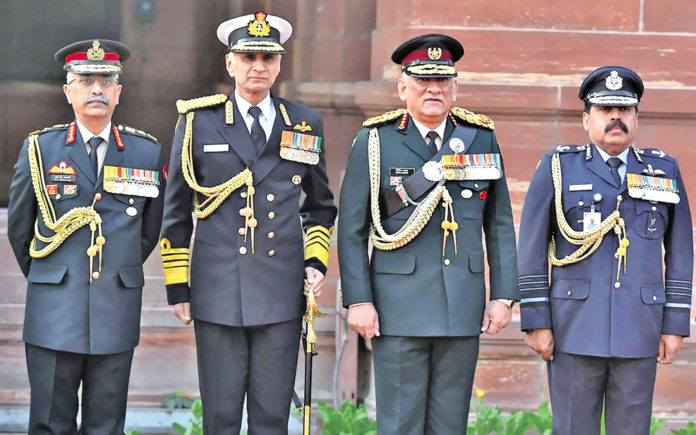
On taking charge of the 1.3-million strong Indian Army as its 28th Chief, on 31 December, Gen MM Naravane sent a stern warning to Pakistan, saying India reserved the right to “preemptively strike” at sources of terror, and asserted that a “new normal” in the country’s response mechanism to acts of cross-border terrorism has already been “emphatically” displayed.
He also said the Army will enhance combat capabilities along the border with China so that it is fully prepared to deal with any security challenge. “The threat remains from both northern and western sides. Over the last many years, we have been concentrating on our western borders while our northern border was at a little lower in priority. There was a need to rebalance and reprioritise,” he said.
Giving a detailed brief on India’s security challenges, including combating cross-border terrorism, Gen Naravane said a strategy of “resolute punitive response” was put in place to deal with Pakistan-sponsored terrorism, noting that the policy of “zero tolerance” will continue to drive counter-terror measures.
“If Pakistan does not stop its policy of state-sponsored terrorism, we reserve the right to preemptively strike at the sources of terror threat and this intent has adequately been demonstrated in our response during surgical strikes and Balakot operation,” the Army Chief said.
“A new normal in our response mechanism has been emphatically underlined,” he added.
Talking about the situation in Kashmir, Gen Naravane said it has improved significantly after abrogation of Article 370. “Incidents of violence are coming down. The terrorists-initiated actions have come down. There is no doubt that there is a lot of improvement,” he said.
“However, the problem remains. It has not gone away. So, we will always be ready whatever measures are required to deal with the challenges there,” he said.
Pak-sponsored Terrorism
“We are better prepared,” said Naravane, adding that the Army is “fully prepared to meet any eventuality” along the volatile Line of Control with Pakistan, which has witnessed as many as 3,200 ceasefire violations this year to beat all annual records since 2003.
“Our neighbour uses terrorism as tool of state policy, as a way of carrying out proxy war against us, while maintaining deniability. However, this state can’t last long. As they say, you can’t fool all the people, all the time,” Naravane said.
Gen Naravane said the Pakistan Army’s “all out efforts” to deflect attention from state-sponsored terrorism has been a total failure and that its proxy war design has received a major setback due to elimination of terrorists and decimation of terror networks by Indian forces. “Multiple options across the spectrum of conflict are on the table to respond to any act of terror sponsored or abetted by Pakistan,” he said.
Gen Naravane said Pakistan tried to draw global attention following India’s decision to reorganise Jammu and Kashmir, but its efforts did not get any traction.
There has been “a definite improvement” in the internal security situation in J&K after the abrogation of Article 370, with the “proxy war” being waged from across the border suffering a major setback due to elimination of terrorists and terror networks. “The incidents of violence in J&K have seen a marked decline, this augurs very well for population of J&K. It’s a step forward towards bringing peace and prosperity to the region,” he said.
Referring to the rising number of ceasefire violations along the Line of Control (LoC), he said it is being done to keep alive the Kashmir issue.
India-China Border
On security challenges along the 3,500-km border with China, Gen Naravane said: “We will continue to improve capability building along the northern border so we are prepared when the need arises.”
Modernisation
According to Gen Naravane, the bottomline for reforms in the Army will be to increase efficiency and operational readiness. “Modernisation is a continuous process. Whatever we are doing, the start point is to increase efficiency and operational readiness,” he said.
On the CDS
The new chief said the appointment of the CDS would significantly transform the way the military operates and bring about important tri-services reforms.
The appointment of Gen Bipin Rawat as India’s first chief of defence staff (CDS) is seen as the most significant change in top military management in the country and would require the CDS to strike a delicate balance with the three chiefs to strengthen cross-service cooperation and build consensus.
Gen MM Naravane, Chief of the Army Staff
Gen MM Naravane did his schooling at Dnyan Prabodhinee Prashala, Pune. An alumnus of the National Defence Academy and the Indian Military Academy, he was commissioned into the 7th Battalion, The Sikh Light Infantry Regiment, in June 1980. He is an alumnus of the Defence Services Staff College, Wellington and Higher Command Course, Mhow. He holds a Master’s Degree in Defence Studies, M. Phil Degree in Defence and Management Studies and is currently pursuing a Doctorate degree.
In a distinguished military career spanning almost four decades, Gen Naravane has the distinction numerous command and staff appointments in peace and field areas both in the North East and Jammu & Kashmir and has been part of the Indian Peace Keeping Force in Sri Lanka during ‘Operation Pawan’.
He has commanded 2nd Battalion, Rashtriya Rifles (Sikh Light Infantry), 106 Infantry Brigade, Inspector General Assam Rifles (North) at Kohima, Nagaland and 2 Corps. On staff, he was a Brigade Major of an Infantry Brigade, Assistant Adjutant & Quartermaster General (AA&QMG) of HQ Establishment No 22, Defence Attache at Yangon, Myanmar, an instructor in the Army War College as Directing Staff in the Higher Command Wing, besides serving two tenures at the Army HQ.
Gen Naravane commanded the Republic Day Parade in 2017 as General Officer Commanding (GOC) Delhi Area. After successfully commanding the Army Training Command, Shimla, he took over as the General Officer Commanding-in-Chief (GOC-in-C) of Eastern Command on 1 October 2018. He took over as the 28th Chjief pof the Army Staff on 31 December and will serve for two years and four months.















